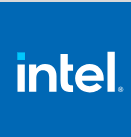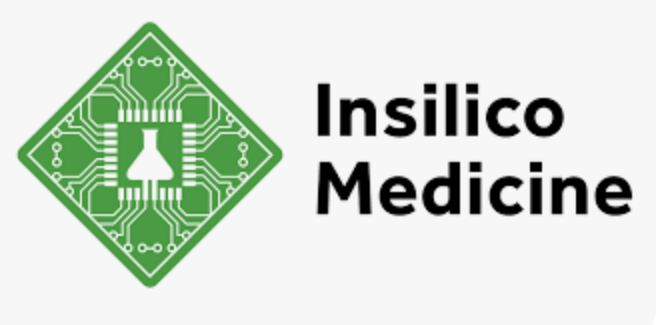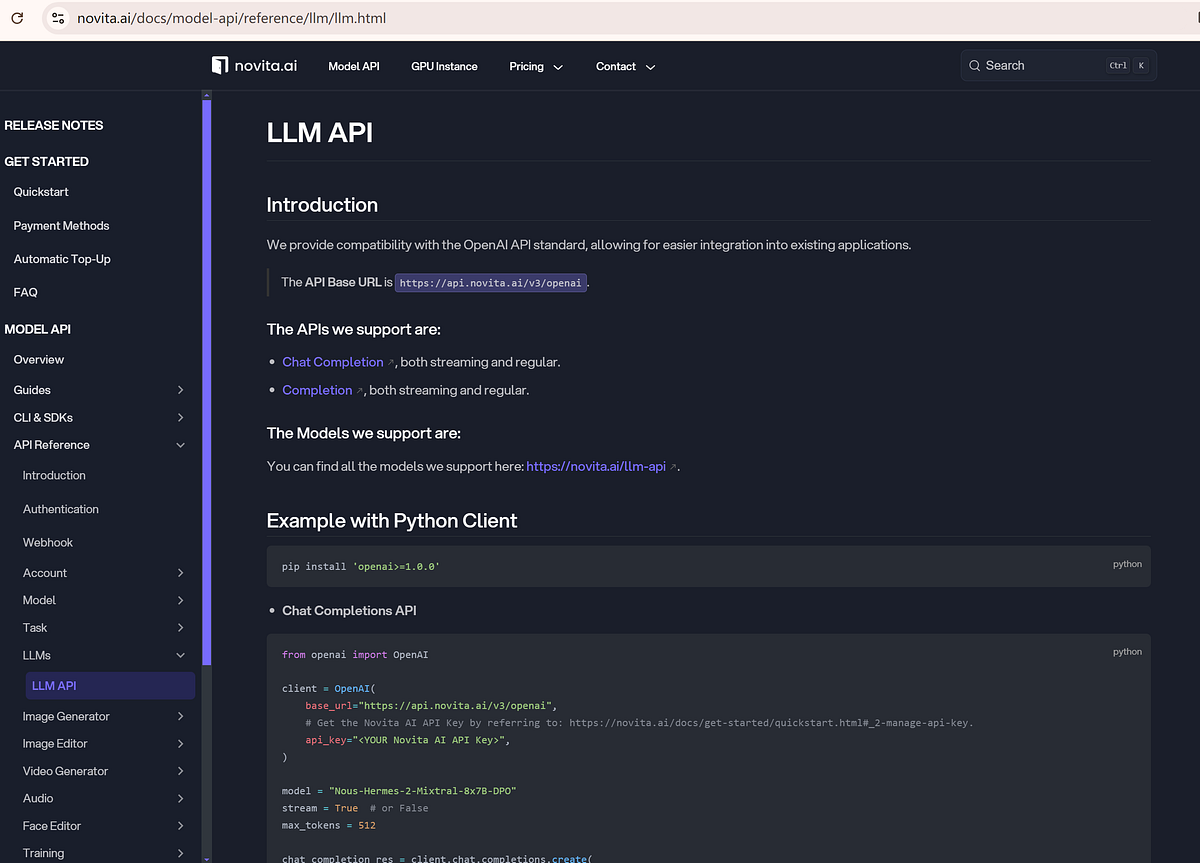Uncover the leading providers of AI technology in health care. Explore how these companies are shaping the future of healthcare technology.
Key Highlights
The healthcare industry uses AI solutions to enhance patient care, improve diagnostics and simplify operations.
The medical AI market is increasing substantially and is expected to expand in the coming years.
Leading technology companies such as Google, DeepMind, Microsoft, and AWS are playing an important role in developing innovative AI tools for healthcare.
Using patient data to deliver personalized medicine is another area where AI is making significant progress.
AI API service platforms such as Novita AI provide LLM API resources for building custom medical AI applications.
Introduction
Artificial Intelligence (AI) has been making waves across various sectors, and healthcare is no exception. Powered by natural language processing and machine learning, AI in health care is changing the industry. It brings new and better solutions that improve patient care and results. With AI algorithms and predictive analytics, healthcare providers can diagnose diseases faster and more accurately. They can also tailor treatments and improve the way healthcare works. In this blog post, we will explore the leading providers of AI technology and how to build your own Healthcare AI tool.
Exploring the Impact of AI on Healthcare
AI in healthcare impacts diagnostic imaging and drug discovery. Algorithms analyze data, spot patterns, and aid professionals in making informed decisions for better patient outcomes. The continued growth of AI promises enhanced patient care, reduced costs, and global health improvements.
The Role of AI in Improving Diagnostic Accuracy
AI can transform healthcare, especially in diagnosis. Machine learning (ML), a subset of AI, relies on data quality and quantity to enhance accuracy. ML aids decision-making, workflow management, and task automation. Deep learning with Convolutional Neural Networks (CNN) and data mining identifies disease patterns in large datasets, benefiting disease detection. These tools are crucial in healthcare for diagnosis, prediction, and classification of diseases, reducing workload for providers and enabling faster decision-making. AI advancements in medical imaging promise innovative approaches to disease prevention, detection and treatment.
AI’s Contribution to Personalized Medicine and Patient Care
AI transforms patient care by enabling personalized medicine. Treatment plans are tailored to each individual’s genetics, lifestyle, and medical history. Generative AI discovers new drugs and predicts patient reactions, improving treatment effectiveness and personalization.
By data analysis, AI identifies trends and forecasts individual responses to treatments, enhancing treatment planning and reducing side effects. This personalized approach enhances patient outcomes and shifts focus towards patient-centric healthcare.
AI in Healthcare Market Size
Market Size in 2024: The global artificial intelligence (AI) in healthcare market was valued at approximately USD 26.69 billion in 2024.
Projected Market Size by 2034: It is predicted to reach around USD 613.81 billion by 2034.
Compound Annual Growth Rate (CAGR): The market is expected to grow at a CAGR of 36.83% from 2024 to 2034.
Here is a graph about Artificial Intelligence in Healthcare Market Size.

Drivers: The market is driven by the ageing population, the rise in chronic diseases, technological advancements in healthcare, and the need for operational efficiency in healthcare organizations.
Opportunities: The market sees opportunities in technological advancements, such as deep learning for medical diagnostics, personalized medicine, and the integration of AI with digital health records.
10 Leading AI Technology Providers in Healthcare
The healthcare industry is changing to use more digital tools. This shift is happening because there is a need to give better patient care, lower costs, and work more efficiently. In this setting, AI technology is becoming very popular. Many companies are at the forefront of this change by creating and offering advanced AI solutions for healthcare.
Here’s a look at 10 healthcare companies leading this change in the healthcare system:
1. Google DeepMind

Google DeepMind is a research organization known for its advanced AI technologies and applications in healthcare. DeepMind focuses on developing cutting-edge AI algorithms, particularly in machine learning and neural networks. Collaborated with Google Heath, they have made great progress in medical imaging, disease detection, and predicting how proteins fold.
These innovative solutions can change how we diagnose illnesses, discover drugs, and create personalized medicine. A good example is the AlphaFold system. It predicts protein structures very accurately. This can help us understand diseases better and find new treatments.
2. Microsoft Healthcare

Microsoft Cloud for Healthcare integrates Microsoft Azure, Dynamics 365, Power Platform, and Microsoft 365 to enhance patient engagement, improve health team collaboration, and provide clinical and operational insights.
It allows for rapid digital transformation tailored to the specific needs of healthcare providers, while also ensuring end-to-end security and compliance of health big data.
3. Amazon Web Services (AWS)

AWS Healthcare offers cloud-based solutions tailored for healthcare and life sciences. It supports organizations in securely managing health data, enhancing patient care, and driving innovation with AI and machine learning technologies. AWS provides specialized tools for data integration, genomics, and medical imaging, and ensures compliance with global healthcare regulations. This cloud AI technology enables healthcare providers to improve efficiency, reduce costs, and advance digital transformation.
4. Merative

Merative, previously Truven Health Analytics and IBM Watson Health, is a healthcare technology company in Ann Arbor, Michigan. They offer data analytics and AI solutions for clinical decision support, trials, imaging, health advanced analytics, and healthcare services. Platforms like Micromedex and Zelta help healthcare organizations and medical professionals improve patient care and operational outcomes.
5. Siemens Healthineers

Siemens Healthineers uses AI to improve healthcare through over 70 AI-powered tools that enhance diagnostics, automate workflows, and support personalized care. Their solutions address the growing demand for medical services and transform healthcare delivery, especially in imaging and disease prediction.
https://www.youtube.com/watch?v=0IGLgzLuobQ
6. Intel Health and Life Sciences

Intel Healthcare leverages advanced technologies like AI, edge computing, and pervasive connectivity to transform healthcare and life sciences. Their solutions enhance patient outcomes, streamline clinical workflows, and accelerate scientific discoveries. Intel’s robust hardware and software ecosystem powers the digital infrastructure needed for modern healthcare, enabling precision medicine, telemedicine, medical imaging, and more.
7. Tempus

Tempus is a technology company focused on precision medicine. It uses AI and data analytics to help healthcare providers make personalized treatment decisions. Tempus specializes in genomic sequencing, clinical trial matching, and real-world medical data analysis, aiming to improve patient outcomes in oncology, neurology, and other fields. The company partners with hospitals, research centers, and pharmaceutical companies to advance medical research and patient care.
8. Insilico Medicine

Insilico Medicine is a biotechnology company that uses AI-driven platforms to accelerate healthcare solutions. Their technologies, including generative AI for novel molecule creation and target identification, aim to significantly reduce the time and cost required to bring new medications to market. Insilico Medicine focuses on extending healthy longevity by addressing diseases through advanced computational methods.
9. Philips Healthcare

Philips Healthcare, a division of Philips in the healthcare sector, is a leading provider of innovative medical solutions that aim to improve patient care and enhance the overall healthcare experience. Philips integrates AI into its healthcare digital solutions to enhance diagnostic accuracy, patient monitoring, and operational efficiency.
10. Komodo Health

Komodo Health is a healthcare intelligence platform that utilizes data analytics to improve patient outcomes and healthcare decision-making. It aggregates and analyzes comprehensive healthcare data to provide insights into patient journeys, treatment patterns, and market dynamics. By leveraging advanced analytics, Komodo Health aims to enhance the effectiveness of healthcare delivery and support stakeholders in making informed decisions.
Boost Business: Build Your Own Healthcare AI Tool
Building your healthcare AI tool might seem hard at first. But platforms like Novita AI make this easier. With Novita AI’s easy-to-use interface and ready-made models, you can build AI solutions for different healthcare needs. You can do all this even if you don’t have much coding skills. Novita AI’s platform helps healthcare professionals, researchers, and developers make the most of AI to improve patient care and results.
Step-by-step Guide with Novita AI
Step 1: Define Your Healthcare Challenge
- Clearly outline the goals and objectives of your AI solution to healthcare problems.
Step 2: Data Collection and Preparation
- Collect healthcare data and conduct data management to train the machine learning model. Ensure the data is high quality and meets privacy and security rules.
Step 3: Select API and AI Models
Choose API for healthcare solutions. LLMs have been used for diagnostics and patient communication. LLM API is a good choice in the healthcare industry. We recommend Novita AI for your cost-effective application and easy integration.
Pick a suitable machine learning model for your healthcare application. You can try llama 3.1 405B, an advanced large language model with over 400B parameters.
Step 4: LLM API Integration
- Log in or create an account on Novita AI. Get $0.5 in API Credits and $1 in GPU Credits for Free with Your First Login!

- Go to LLM API Key Management to get your key.

- After obtaining your API key, navigate to Novita AI LLM API. Enter the API key to continue the following tasks.

- We have free vouchers for you upon your first login. To add more credits, you can go to Novita AI Billing Management.
Step 4: Model Evaluation and Deployment
Check how well the model works using the right metrics. Improve and optimize your model based on the results of the evaluation.
Launch your AI application in a secure healthcare setting, connecting it with current systems if needed.
Step 5: Monitor & Update
- Continuously monitor the tool’s performance and update it based on new data or medical guidelines.
Conclusion
In conclusion, using AI in healthcare is changing the industry for the better. It is changing how we diagnose illnesses, treat patients individually, and provide overall care. Major companies such as Google DeepMind and Microsoft Healthcare are leading this change. The future of healthcare depends on using AI technology to get better results in applicable use cases and change how we solve medical issues. As we see quick progress in this area, healthcare professionals need to use these tools to provide better and more effective care and medical advice for patients.
Frequently Asked Questions
What Are the Key Benefits of Implementing AI in Healthcare?
Key benefits of implementing AI in healthcare include enhanced diagnostic accuracy, increased operational efficiency, personalized treatment plans through predictive analytics, improved patient engagement, and reduced costs.
Which countries are using AI in healthcare?
The top are from North America (the United States and Canada), Europe (Italy, and Germany), and China.
Can AI in Healthcare Help in Managing Chronic Diseases?
AI in healthcare manages chronic diseases by enhancing predictive modelling, enabling early detection, personalizing treatment plans, and facilitating real-time remote monitoring, thereby improving patient outcomes and optimizing healthcare resource utilization.
What Are the Ethical Considerations of AI in Healthcare?
Ethical considerations in healthcare AI involve patient privacy, data security, bias, transparency, and outcomes accountability. Balancing innovation with ethics is crucial for healthcare safety.
Originally published at Novita AI
Novita AI is the All-in-one cloud platform that empowers your AI ambitions. Integrated APIs, serverless, GPU Instance — the cost-effective tools you need. Eliminate infrastructure, start free, and make your AI vision a reality.
